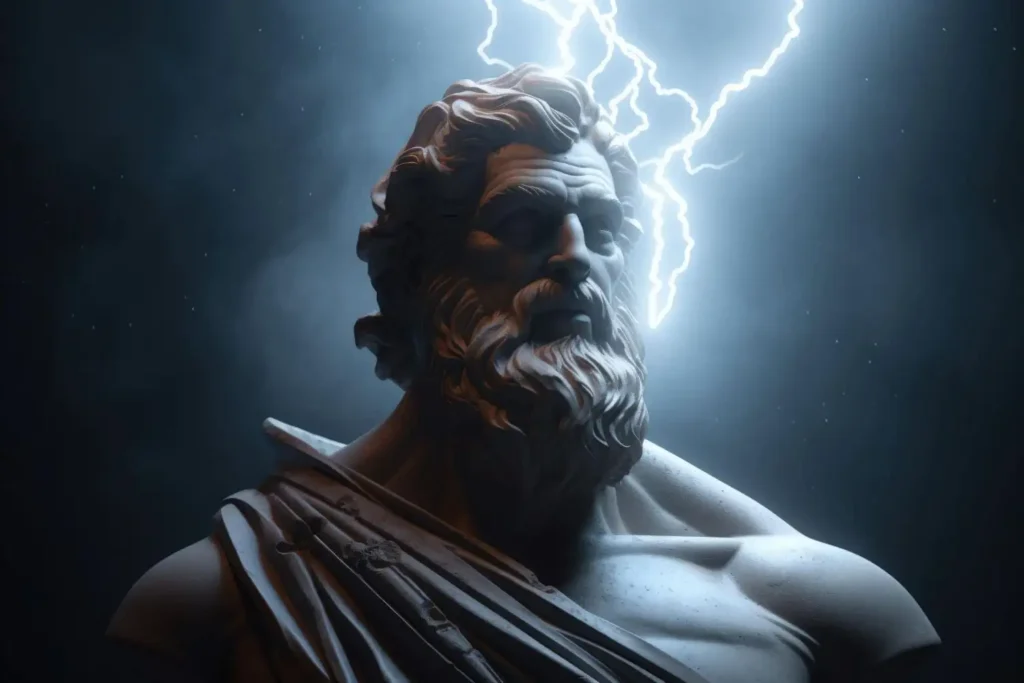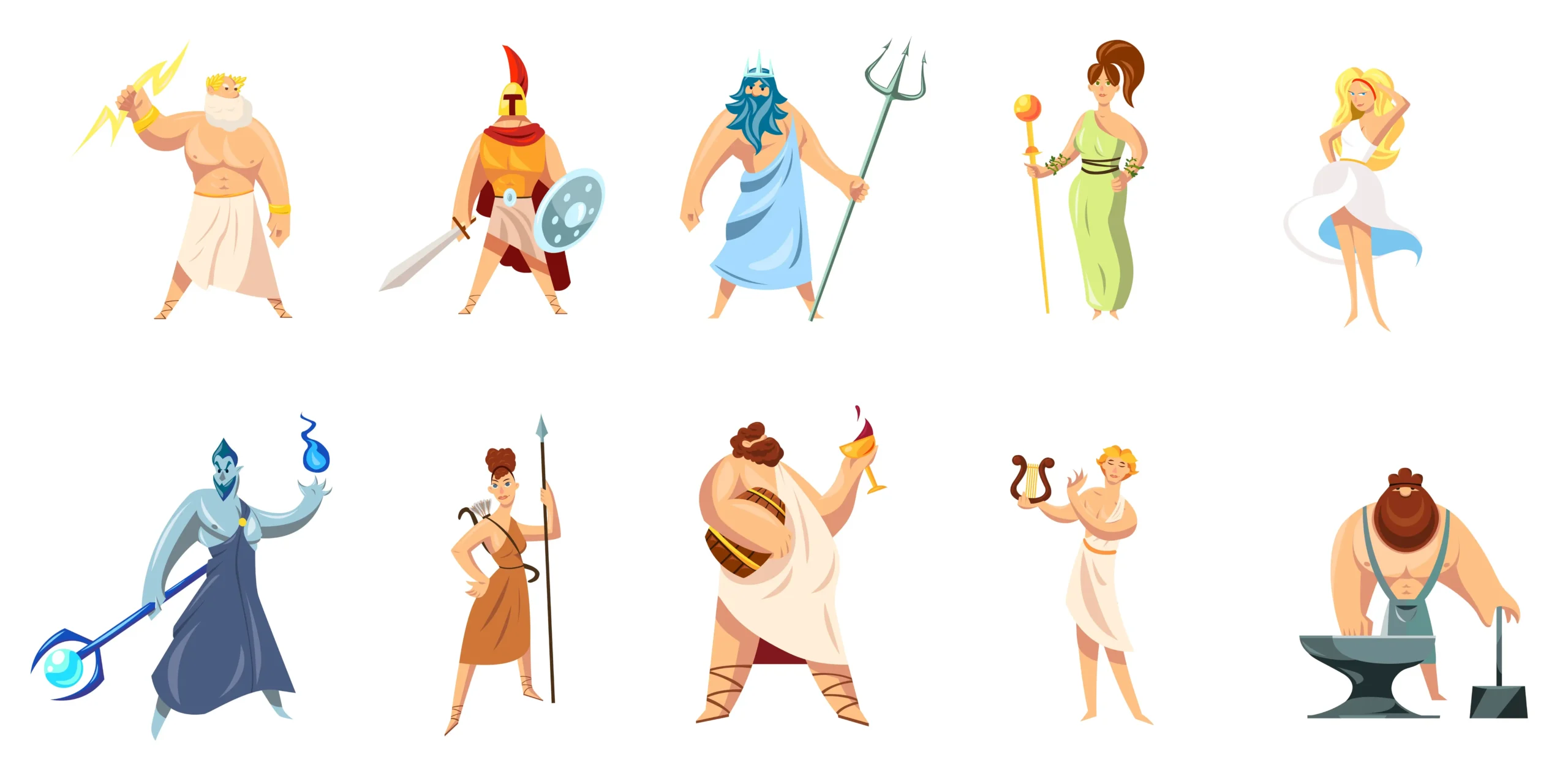Lets explore 12 greek gods and goddesses who played significant roles in shaping the Greek pantheon. These powerful deities, residing on Mount Olympus, hold great influence over various aspects of human life and the natural world.
In this article, we will delve into the origins of these gods, explore their individual characteristics and stories, and examine their enduring impact at ancient greek religion and the modern world.
Table of Contents
The Origins of the Greek Gods
The origins of the ancient greek gods and goddesses can be traced back to the Titans, a race of powerful beings that preceded them. The Titans ruled the universe, but their own children, led by Zeus, overthrew them. This event, called Titanomachy, marked the start of the era of the Olympians.
Zeus – King of the Gods

Zeus, was the ruler of Mount Olympus as the king of the gods. Known for his thunderbolts and lightning, Zeus was the god of the sky and thunder. He was often depicted with a regal beard and a thunderbolt in his hand, symbolizing his immense power. Zeus was the father of many gods and mortals, making him one of the most influential figures in Greek mythology. His power extended over all other gods and mortals, making him the supreme deity.
Hera – Queen of the Gods
Hera, the wife and sister of Zeus, was the queen of the gods. As the goddess of marriage and childbirth, she represented the ideal image of a wife and mother, often depicted as a majestic figure, embodying loyalty and commitment. Hera was known for her beauty and jealousy, often punishing Zeus’s lovers and their offspring. Despite her strict nature, she played an important role in protecting marriage and family.
Poseidon – God of the Sea
Poseidon, the brother of Zeus, ruled over the vast seas and oceans. As the god of the sea, he was often depicted with a trident, which he used to control storms and earthquakes. Poseidon was known for his volatile temper and association with horses. He played a crucial role in Greek mythology, particularly in stories involving heroes’ journeys across treacherous waters.
Athena – Goddess of Wisdom
Athena, born fully formed from Zeus’s head, was the goddess of wisdom, courage, and strategic warfare. She was often portrayed wearing a helmet and carrying a shield. Athena was highly revered by both gods and mortals for her intelligence and tactical skills. Known for her strategic prowess, Athena played a vital role as a protector of heroes and also patroness of various crafts.
Apollo – God of Music and Prophecy
Apollo, the son of Zeus and Leto, was the god of music, poetry, prophecy, and healing. He was associated with enlightenment and artistic inspiration, with light and truth, often depicted with a golden lyre or bow. Apollo was renowned for his musical abilities and was considered the leader of the Muses. He also served as an oracle at Delphi, providing prophetic guidance to seekers.
Artemis – Goddess of the Hunt
Artemis, Apollo’s twin sister, was the goddess of the hunt, wilderness, and childbirth. She was often portrayed with a bow and arrow, accompanied by a pack of hunting dogs. Artemis was fiercely independent and protected both animals and young women during childbirth. She represented the untamed aspects of nature and was greatly revered by hunters and those who lived off the land.
Aphrodite – Goddess of Love
Aphrodite, born from sea foam, was the goddess of love, beauty, and desire. She was often depicted as a seductive figure, a stunningly beautiful woman emerging from the sea. Aphrodite possessed an irresistible charm that caused gods and mortals alike to fall in love with her. She capable of bringing both joy and heartache, played a significant role in various love stories and was associated with passion and desire.
Ares – God of War
Ares, the son of Zeus and Hera, was the god of war and violence. Ares embodies the chaotic and destructive aspects of warfare. He personified the brutal aspects of conflict and was often depicted wearing armor and carrying a spear or sword. Ares was considered reckless and bloodthirsty, contrasting with his sister Athena’s more strategic approach to warfare. Despite his aggressive nature, he played an essential role in battles fought by gods and mortals.
Demeter – Goddess of Agriculture
Demeter, the sister of Zeus, was the goddess of agriculture, fertility, and harvest. She was responsible for ensuring bountiful crops and abundant harvests for mortals, brings prosperity to the earth. Demeter’s grief over abduction of her daughter Persephone by Hades led to the changing seasons on Earth, symbolizing her sorrow during Persephone’s time in the underworld.
Hermes – Messenger of the Gods
Hermes, the son of Zeus and Maia, the god of travel, trade, and communication. Served as the messenger of the gods. He was known for his speed and agility, often depicted with winged sandals and a caduceus. Hermes played a crucial role in delivering messages between gods and mortals, as well as guiding souls to the world after death. He was also associated with commerce, travel, and thieves.
Hephaestus – God of Fire and Forge
Hephaestus, born to Hera without a father, was the god of fire, forge, and craftsmanship. He was known for his exceptional skill in metalworking and blacksmithing. Despite being physically disabled, Hephaestus is a skilled artisan who created magnificent weapons and artifacts for gods and heroes alike. He played an important role in Greek mythology as both a creator and a protector.
Dionysus
The god of wine, revelry, and ecstasy. Dionysus represents the celebration of life and the freedom to express oneself. Dionysus is often depicted as a young and handsome god, crowned with ivy leaves and holding a thyrsus, a staff entwined with ivy and topped with a pine cone. He is associated with the vine and the cultivation of grapes, symbolizing the transformative powers of wine.
Hades – God of the Underworld
Other than the 12 Gods and Goddess above, there is another god known as Hades, the brother of Zeus and Poseidon. He ruled over the underworld – the realm of the dead. As the god of wealth and death, Hades commanded respect from both gods and mortals. Although feared for his role as judge of souls in the afterlife, Hades maintained a sense of fairness in his dealings with mortals. The causes of Hades not included as an Olympian God is because he did not stay on Mount Olympus but instead lived in the Underworld.
Connections and Influence
The gods of Greek mythology have had a profound impact on various aspects of human civilization. Their stories have inspired countless works of literature, art, and drama throughout history. Additionally, many of their traits and attributes have been adopted by modern societies.
For instance, the concept of Zeus as a powerful ruler has influenced the perception of kings and leaders throughout different cultures. Athena’s wisdom and strategic thinking continue to be admired in the realms of education and military tactics. The celebration of love and beauty, epitomized by Aphrodite, remains a fundamental aspect of human culture.
Conclusion
The Twelve Olympian Gods and Goddesses hold a significant place in Greek mythology and continue to captivate our imagination today. Their stories have been passed down through generations, serving as a source of entertainment, guidance, and insight into the human condition. As we explore these ancient tales, we gain a deeper understanding of our own aspirations, fears, and desires.
The gods and goddesses of Greek mythology represent the diverse aspects of the human experience, reminding us of our own strengths and weaknesses. Their influence can be seen in various aspects of our society, from art and literature to language and philosophy. As we navigate the complexities of the modern world, we can still find wisdom and inspiration in the tales of these timeless deities.


